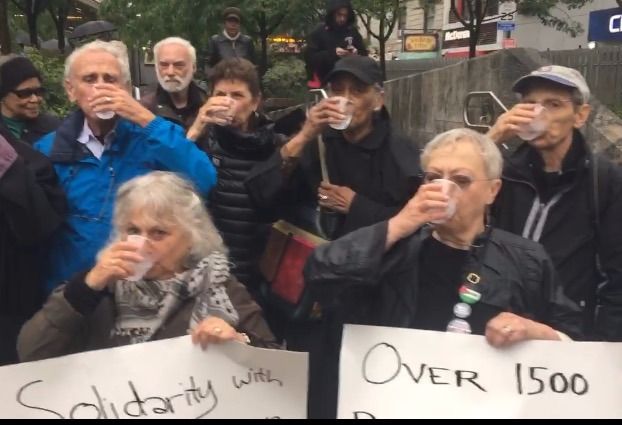The article has serious conceptual flaws as well as factual inaccuracies that mischaracterize and do a disservice to movements for justice, and, as a result, make accusations of marginalizing Jews that are not rooted in reality.
To say, as the author does in her article, that “As a paradigm, intersectionality has failed Jews” makes little sense. As a lens through which to understand multiple dimensions of power — where and how they do or don’t intersect or connect — intersectionality does not “fail” any group.
Further, the author writes, “Intersectionality would dictate that the oppression of Palestinians is much worse than the oppression of Jews, and thus a much higher priority…. It is at the end of the day a hierarchical structure, one that creates a hierarchy of oppression and determines levels of threat.”
Intersectionality, a term coined by legal scholar Kimberlé Crenshaw, is precisely not about promoting hierarchies of oppression (thereby leaving out the Jews), but is a framework — an analytic tool — that focuses on the multiple effects and overlap of structural oppressions among communities that have been impacted by injustice.
In “What is Intersectionality and Why Do You Keep Insisting that Movements Must Be Intersectional?” by Evonnia Woods, the author makes clear that:
Much of the confusion regarding what intersectionality is stems from the way we have been trained to think, which happens to be the very way of thinking the concept aims to overcome. We are trained to think in binaries/dualisms and hierarchies….
This is why the versatility of how intersectionality can be employed is lost in many people’s understandings of the concept. Intersectionality is a paradigm, a methodology, and a tool for liberation….
We can use intersectionality as a means to garner and evaluate information. We can also use it in social movements to attain liberation, equity and justice. Therefore, intersectionality is a concept employed to guide us in how we think (and thus behave), study the social world and fight for fairer life experiences. It is this fight for fairer life experiences from which the notion that movements must be intersectional is derived.In “Under Western Eyes” Revisited: Feminist Solidarity through Anticapitalist Struggles, Chandra Talpade Mohanty meaningfully frames a conceptualization of intersectional principles and realities that is not about leaving someone behind but, rather, about building meaningful solidarities:
In knowing differences and particularities, we can better see the connections and commonalities because no border or boundary is ever completely or rigidly determining. The challenge is to see how differences allow us to explain the connections and border crossings better and more accurately, how specifying difference allows us to theorize universal concerns more fully. It is this intellectual move that allows for my concern for women of different communities and identities to build coalitions and solidarities across borders.
Rather than recognizing and building from this analysis as articulated by Mohanty and others, Ungar-Sargon, through a misframing of intersectionality as the source of the problem, instead focuses on what she believes is an insensitivity to Jews, and her piece continues in that vein. For example, she takes specific feminists and “the left” to task for not wanting the Anti-Defamation League (ADL) to co-facilitate an anti-racist training. While she does acknowledge some problems with the ADL, she largely defends the organization and its new director.
I find it unimaginable that the author is not aware of the abundance of evidence (see here and here, for example) pointing to the ADL’s role, historically as well as presently, in promoting anti-Palestinian policies and Islamophobia, and in targeting activists for justice. The author does mention that the current CEO, Jonathan Greenblatt, proudly attended the embassy move in Jerusalem, but doesn’t seem to consider that to be a major problem that speaks to who Greenblatt and the ADL are. (As if this wasn’t enough, Greenblatt’s joyous moment took place as Israel was killing Palestinians in Gaza for protesting for their basic rights.) That fact alone — and there are many others — should make it clear why the ADL wasn’t a fit partner for an anti-racism training.
It’s one thing to suggest that we all need to open our hearts to working with new people and groups; it’s quite another to suggest that it’s “anti-Jewish” to not agree to work with an organization like the ADL that, while promoting itself as an anti-defamation organization, targets communities with long histories facing structural racism and injustice in the US, as well as those who support Palestinian rights. Minimizing that fact is incredibly disrespectful to the many communities that have been at the receiving end of ADL’s discriminatory positions and whose lives have been harmed as a result.
The faulty logic is not only with the author’s mischaracterization of opposition to ADL as being anti-Jewish; one of the most egregious accusations she makes is asserting that, since most Jews support Zionism, if you leave out Zionism from social justice struggles, then you are saying Jews aren’t welcome. She doesn’t show evidence pointing to her pronouncement that most Jews support Zionism, and there is actually evidence to the contrary. But, even if it were true, the fact that opposing Zionism — which is responsible for the Nakba, the dispossession of 750,000 Palestinians from their homes and land — is conflated with excluding Jews, again, shows a distortion of facts to make her point about Jews being excluded. Zionism is an ideology, and even if Jews adhere to it, it is not “anti-Jewish” to oppose it. It is about challenging structures of oppression.
She continuously reinforces the false and dangerous notion that to oppose Zionism is to be against Jews: “On the other hand, Jews feel that when they do show up, there’s always something wrong with them. They are expected to check their Zionism at the door, for example, or to support a Black Lives Matter platform that accuses Israel of genocide (one can be very critical of Israel’s blatant civil and human rights violations and still feel that such an absurd overstatement would be impossible to endorse).” She does make herself clear that she has no respect for the accusation of genocide made against Israel, though I wonder how much she has challenged herself and engaged with the fact that there has been much written pointing to the ways Israel’s treatment of Palestinians has aptly been called genocide. However, regardless of one’s position on the use of genocide to describe Israel, this is a charge about Israel’s behavior as a nation-state, and not about Jews.
Finally, the author lumps together all of the left, seemingly revealing an underlying animosity, and what she writes about its views on Jews reveals yet again her consistent conflation of Jews with criticisms of Zionism or Israel. She writes (without any evidence): “It is indicative of a fundamental flaw on the left — its eagerness to find fault with Jews while being unwilling to acknowledge anti-Semitism.” This assertion contradicts the articulated deep commitment among so many social justice groups to oppose all forms of oppression, including anti-Semitism. But — and this is what really seems to irk the author — this cThis kind of misrepresentation and mischaracterization is not a way toward building meaningful relationships or to be genuine partners in the struggle for justice. Finding fault with Zionism is not the same as finding fault with Jews. It’s an insulting and harmful framing. In fact, challenging anti-Semitism and challenging Zionism are both necessary in intersectional struggles to achieve justice.
Donna Nevel, a community psychologist and educator, is co-director of PARCEO, a participatory research center. She is a coordinating team member of Facing the Nakba and a co-convener of Jews Against Anti-Muslim Racism, and was a co-founder of Jews for Racial and Economic Justice. Most recently, she is a co-editor of “Moving Forward,” a special issue on the Nakba and the Jewish National Fund, published by Jews Say No!.ommitment also includes opposing Zionism. Further, nobody is suggesting there isn’t anti-Semitism among anyone on the left — that would be a foolish claim — but this is significantly different from making a sweeping generalization that those on “THE LEFT” have an “eagerness to find fault with Jews.”











